So far this week, aside from a guy on balls, we’ve met a woman pretending to be a man, a woman acting like a man (instantiated lust and violence included) and today we’ll travel with an Englishwoman from the early 1600s who was scorned for making money as an independent writer. More tellingly, she was attacked for her open discourse on sex and relationships, depicting in no uncertain terms the double standards held for women and men and writing about (homo)sexuality like a man.
Aphra Behn’s writing, in novels, plays and poems, was considered scandalous; even posthumously, centuries later, people like Alexander Pope and contemporaries had this to say: Behn “might have been an honor to womanhood—she was its disgrace. She might have gained glory by her labors—she chose to reap infamy.”
Robert Markley, a current scholar of 17th century theatre, phrases it this way: “In their ironic treatment of female chastity and masculine constancy…her comedies present a sophisticated and sympathetic understanding of the ideological complexities of women’s existence in a misogynistic society.”
She had quite a bit of adventure under her belt before she rose to “infamy:” travel to Surinam, where she met and befriended some of the natives, leading to a searing condemnation of slavery in her most famous novel Oroonoko. An assignment as spy under the code name Astrea, hired by Charles II during the Interregnum to find and turn some guy in Holland, a job that she failed miserably. She was thrown into debtor’s prison because her meager allowance ran out and she had been borrowing money for the trip back to England, money that the British government refused to refund. Eventually she started writing enormously successful plays with psychological insights way ahead of her times.
Heralded by her peers as a successor to Sappho, her poetry was explicit about sexuality. Her most famous poem is called The Disappointment. Here is a quote about if from the Poetry Foundation: (click on title to read the poem.)
“The Disappointment” has been traditionally interpreted to be about impotence. But it is also about rape, another kind of potency test, and presents a woman’s point of view cloaked in the customary language of male physical license and sexual access to females. The woman’s perspective in this poem provides the double vision that plays the conventional against the experiential.”
More detailed discussion of her works are here:
https://www.poetryfoundation.org/poems/43639/the-disappointment
And her life in general, here:
The First English Woman to Make a Living as a Writer Was Also a Spy
I was struck when I compared these three adventure-seeking women as to how much they had in common, across centuries: they were not willing to conform to the gender rules of their times, and tied sexuality in direct and explicit ways to their assessment of gender relations or their enactment of gender relations – throwing all caution to the wind. They were willing to be bad girls, in contrast to the good little women who surrounded them. Got to see the world, too, this way.
Yesterday’s NYT editorial spoke to this distinction of Madonna/Whore in clear and concise ways, and clarified the role of misogyny as “the law enforcement arm of patriarchal order, which has the overall function of policing and enforcing its governing norms and expectations.” Including the function of punishing the bad girls and rewarding the good ones…. click on photo for full article. Hey, I stayed away from contemporary politics for at least 6 paragraphs!
Photographs from Holland, where Behn did not excel at spying.















Deb
Everyone knows bad girls have more fun! But I like to think that good girls are just bad girls who didn’t get caught! Really enjoyed reading your message today. Let’s hope all girls can follow their desired adventures with their own compass!
Sara Lee
Loved the photos. Good to be reminded of Behn. And congrats on managing six paragraphs – count ’em! – without mentioning the judicial disaster that appears to be unfolding today….